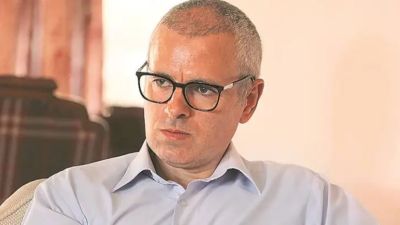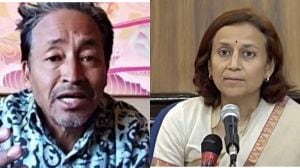Explained: Why have filmmakers written an open letter to MAMI?
More than 15 independent filmmakers, from among the 30-plus selected for this year’s now-cancelled Jio MAMI Mumbai Film Festival, have written an open letter, disappointed with MAMI’s decision to cancel physical screenings. What are their concerns?
 MAMI decided to go ahead with online screenings (on Shift 72 platform), from February 24 to mid-March, for 48 hours for each selected film consented to by the filmmakers. (File Photo)
MAMI decided to go ahead with online screenings (on Shift 72 platform), from February 24 to mid-March, for 48 hours for each selected film consented to by the filmmakers. (File Photo)More than 15 independent filmmakers, from among the 30-plus selected for this year’s now-cancelled Jio MAMI Mumbai Film Festival, wrote an open letter on Friday (February 25), disappointed with MAMI’s decision to cancel physical screenings. It made “a public appeal for MAMI to plan a set of physical screenings, and to the people of Mumbai, and supporters elsewhere, who care about independent cinema, to express their support.”
MAMI decided to go ahead with online screenings (on Shift 72 platform), from February 24 to mid-March, for 48 hours for each selected film consented to by the filmmakers. There were “mixed reactions” about the online screenings — among those who opted out, some haven’t had world premieres yet and others have waited for a physical India premiere.
“This offer (online screening) did not adequately address our concerns with the fate of our films, or our feeling of discontent with the manner and timing of this decision. We collectively requested a meeting with the organisers to discuss other ways forward, but this request was ignored,” read the open letter, whose signatories include filmmakers Achal Mishra, Haobam Paban Kumar, Gurvinder Singh, Payal Kapadia and Ranabir Das, Aditya Vikram Sengupta, Irfana Majumdar, Rahat Mahajan, Nithin Lukose, Natesh Hegde, Rahul Jain and Sanal Kumar Sasidharan, among others. We look at the concerns and demands of the filmmakers.
How did things spiral?
The physical edition of MAMI was cancelled in 2020 owing to the pandemic and in 2021 it was postponed. “The 22nd edition would normally have taken place in November 2021, but was postponed till March 11-15, 2022,” read the letter. The filmmakers received a communication on February 4 from the festival organisers, stating that “despite our best efforts, it has become untenable for us to hold the festival in March. The continuing pandemic, logistical and financial challenges have all contributed to this unavoidable decision we have had to make.”
Winner of the Golden Gateway of India award for Chauthi Koot (2015), Singh, whose films have premiered at MAMI in the past, stated, “It is the whole abruptness of it. Just a week before they had asked us to send them our film (viewing) links and we thought everything was going fine, then what happened in a week?”
The letter makes an appeal to the festival organisers as well as MAMI chairperson Priyanka Chopra Jonas, who was appointed in August 2021, four months after Deepika Padukone stepped down as the chairperson. The “deprived” filmmakers wrote, “Some of us were officially selected in the 2020 edition and had saved our India premieres for two years, waiting for this festival! Others had turned down multiple other festivals in India” (DIFF Dharamshala, IFFI Goa, and IFFK Kerala) “in favour of MAMI. Most of us were counting on the festival to give our films visibility and a unique opportunity to share them with audiences, the industry and market as most of our films will not get distribution in the way commercial films do. None of us has a plan for how to proceed now.”
When and why was MAMI launched?
While Calcutta and Thiruvananthapuram already had their own film festivals, Mumbai did not have one till 1997, when MAMI (Mumbai Academy of Moving Image), a non-profit public trust, was born with the efforts of filmmaking stalwarts such as Amol Palekar, Shyam Benegal, Ramesh Sippy and Hrishikesh Mukherjee. Aimed at bringing the best of Indian and world cinema to Mumbai cinephiles and touted as India’s first “independent” film festival, it was free of any government or bureaucratic interference. It intended to nurture the best of emerging Indian cinema and filmmakers. The then organisers, reportedly, had declined a PepsiCo sponsorship, refusing to call it “the Pepsi film festival,” wrote author and film critic Anupama Chopra, in a news magazine in 1997. Currently the MAMI festival director, she further wrote, “This festival isn’t about parallel or mainstream cinema. MAMI trustees would like to emulate the London film festival where one can see both Spielberg and Truffaut.”
In the past, several acclaimed films have been screened at the festival, including Govind Nihalani’s Hazaar Chaurasi Ki Maa, Luc Besson’s The Fifth Element, Rima Das’s Village Rockstars and Bulbul Can Sing, and Pushpendra Singh’s Maru ro Moti.
In the last seven years, MAMI has expanded its scope with initiatives like the MAMI Year Round Programme and an online knowledge series Dial M For Films, among others.
What are the concerns of the filmmakers?
On why he signed the petition though his film Dhuin was screened this week online by MAMI, filmmaker Achal Mishra said, “It’s not just about my film but independent films in general. A lot of us were disappointed with the decision to cancel the festival. We went ahead with the online screening because our film is 50-minutes long, which limits our festival/release possibilities, and MAMI — physical or online — seemed like the only option to show the film to the audiences.”
Majumdar and Singh, among others, opted for no online screening, which, Majumdar said “doesn’t qualify as a festival”.
Singh notes that there is a “huge issue with piracy”. Sasidharan has withdrawn his latest Tovino Thomas-starrer Vazhakku, which was selected for the India Gold section. “We know the current global situation and every country is concentrating on their own country and culture… If MAMI is also going the ‘silent death’ way, it is really sad. Will that be the future of festivals, now that people are too comfortable watching on their gadgets? A filmmaker still wants his/her film to be seen on the big screen, what we make is an art form, for collective enjoyment, followed by a Q&A with the audience, not pure entertainment, and that’s why the petition,” adds Sasidharan.
How did MAMI manage fund crunch in the past?
In 2014, when the 16th edition of MAMI was hit by fund crunch, after its only sponsor Anil Ambani’s Reliance Entertainment pulled out after a five-year partnership, citizens came together to save the festival, which required Rs 5 crore. Donations were collected through a fundraiser and social-media campaign #pledge4MAMI — contributions came from industrialist Anand Mahindra (Rs 60 lakh), producer Manish Mundra (Rs 50 lakh), Aamir Khan (Rs 11 lakh), the state government (Rs 10 lakh), and many cinephiles and industry people, including Rajkumar Hirani, Hansal Mehta, Vidhu Vinod Chopra, Anupama Chopra, Anurag Kashyap, Farhan Akhtar, Zya Akhtar, Shahid Kapoor and Kamal Haasan, among others. The next year, the festival found a new management. Reliance Jio Infocomm became its title sponsor and Star India came on board as associate sponsor. However, in 2019, Star India became a subsidiary of Disney India, and ceased to be the associate partner during the pandemic. Other partners of the festival, including PVR Cinemas and JW Marriott, have also been impacted by the pandemic.





- 01
- 02
- 03
- 04
- 05

































